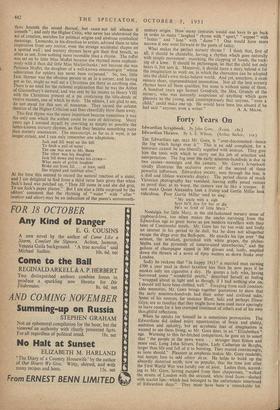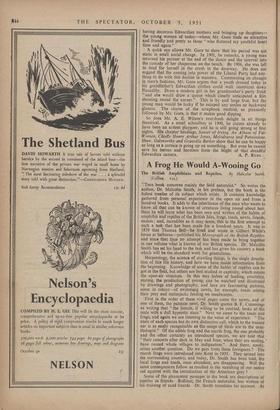Forty. Years On
THE Edwardian age, says Mr. Gore, is "over-documented—hence the fog which hangs over it." This is an odd complaint, for a historian cannot be too liberally supplied with sources. They give him the tools with which to carry out his job of selection' and interpretation. The fog over the early nineteen-hundreds is due to two causes—nostalgia and the camera. Mr. Gore's Scrapbook vividly illustrates the occlusive power of the second of these powerful influences. Edwardian society, seen through the lens, is a dull and lifeless waxworks display. The period charm of much Victorian photography has vanished, leaving stiffly posed victims as proof that, at its worst, the camera can lie like a trooper. It can make Queen Alexandra look a frump and Gertie Millar look ridiculous. Poor Gertie Millar used to sing: " My uncle with a sigh
Says he'll live for her or die He's so fond of little Mary."
Nostalgia for little Mary, in the old-fashioned nursery sense of cupboard-love, too often makes the uncles surviving from the Edwardian age as great bores as are modern travellers with their tales of Continental meals. Mr. Gore has far too wide and lively an interest in his period to be dull, but he does not altogether escape the dirge over the flesh-pots. He smacks his lips over "the salmon, the ortolans, garnished with white grapes, the peches- Melba and the pyramids of tomato-sized strawberries," and the gallons of champagne sipped in 300 glasses and, lastly, emptied down the throats of a score of tipsy waiters as dawn broke over London.
Sadly he reckons that "in happy 1913" a married man earning 000 a year paid in direct taxation less than he now pays if he smokes only ten cigarettes a day. He quotes a lady who, having borrowed some "wonderful pearls," described herself as feeling "wrapped about in light and as though, if I had nothing else on, I should still have been clothed, well." Escaping from such comfort- able memories, Mr. Gore brings together quotations to show that the early nineteen-hundreds had their sober and civilised sides. Some of his sources, for instance Blunt, Saki and perhaps Elinor Glyn, are so familiar that they might have been used more sparingly to leave room for a less cramped treatment of others and of his own thoughtful reflections.
When he speaks for himself he is sometimes provocative. The Edwardians did indeed enjoy opportunities of brain and ability, ambition and industry, but an acrobatic feat of imagination is wanted to see them living, as Mr. Gore does, in an " Elizabethan " age. Warming to this far-fetched comparison, he goes on to assert that "the people in the news were . . . stranger than fiction and more real, Long John Silvers, Fagins, Lady Catherine de Burghs, larger than life and full of it to bursting. They roared convincingly, as lions should." , Pleasure in emphasis makes Mr. Gore readable, but tempts him to odd ()biter dicta. He helps to build up the
absurdly distorted myth, now so popular, that the time just after the First World War was luridly out of joint. Ladies then, accord- ing to Mr. Gore, having escaped from their chaperones, "walked the streets of London with the strained, white tired faces—slashed with scarlet lips—which had belonged to the unfortunate sisterhood of Edwardian days." They must' have been a remarkable lot. having decorous Edwardian mothers and bringing up daughters— the young women of today—whom Mr. Gore finds as attractive and friendly and pretty as those "who fluttered my youthful heart time and again."
A quick eye allows Mr. Gore to show that his period was not static in small social change. In 1901, he remarks, a young man returned his partner at the end of the dance and the interval into the custody of her chaperone on the bench. By 1906, she was left to fend for herself in the crush in the doorway. He does not suggest that the coming into power of the Liberal Party had any- thing to do with this decline in manners. Commenting on changes in men's fashions, Mr. Gore argues that a youth dressed today in his grandfather's Edwardian clothes could walk unnoticed down Piccadilly. Dress a modern girl in her grandmother's party frock " and she would draw a queue which clearly anticipated a film shooting round the corner." This is by and large true, but the young man would be lucky if he escaped any smiles or backward glances. The charm of the scrapbook method, as pleasantly followed by Mr. Gore, is that it makes good dipping.
So does Mr. A. E. Wilson's ever-fresh delight in all things theatrical. As a small schoolboy in 1900, he claims already to have been an ardent playgoer, and he is still going strong at first nights. His chapter headings, Sunset of Irving, An Album of Fair Women, Chiefly Henry Arthur Jones, Melodrama and Pantomime, Shaw, Galsworthy and Granville Barker show that he can be happy so long as a curtain is going up on something. But even he cannot save his heroes and heroines from the blight of that dreadful






















































 Previous page
Previous page